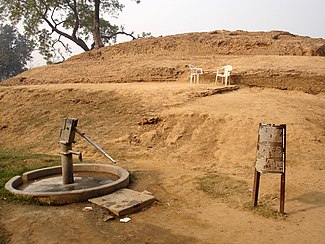Pava
| Pilgrimage sites |
|---|
| Four main sites |
| Four additional sites |
| Other sites |
|
Pāvā (now Padrauna) was a city in ancient India during the life-time of Gautama Buddha. Pāvā was an important city of the Malla tribe, located about 15 kilometres east of Kushinagar in Uttar Pradesh, India.
The Buddha taught the the Cunda Sutta in Pava, and which he presented the "ten courses of wholesome action" (kuśalakarmapatha). The Buddha also visited Pāvā shortly before he passed away, and he ate his final meal there, at the home of his disciple Cunda.
The last meal of the Buddha
According to the Mahaparinibbana Sutta, when the Buddha reached his eightieth year, he and some of his disciples undertook a months-long journey that would take them from Rājagṛha, through Pāṭaliputta, Vesāli, Bhoganagara, and Pāvā, to their final destination at Kuśinagara.[1]
At Pāvā, the Buddha rested in the mango grove of his disciple Cunda, and Cunda served them a meal of sweet rice, cakes, and sūkaramaddava.[2] "The Buddha told Cunda to serve the sūkaramaddava only to him and to bury the rest in the ground because no one other than the Buddha would be able to digest it."[2] Shortly thereafter the Buddha suffered an attack of dysentery.[2] "The Buddha proceeded to Kushinagar, where he instructed Ānanda to visit Cunda and tell him that he should not feel remorse; he had in fact gained great merit by serving the Buddha his last meal."[2]
Soon afterwards, the Buddha attained parinirvana. After the Buddha's cremation, the Mallas of Pāvā claimed a share in his relics. A Brahmin named Drona satisfied their claim, and a stupa was erected in Pāvā over their share of the relics.[3]
Notes
- ↑ "Mahāparinibbāṇa Sutta (DN 16), translated from the Pali by Ṭhānissaro Bhikkhu". Dīgha Nikāya of the Pali Canon. dhammatalks.org. 2022. Retrieved 9 October 2022.
- ↑ 2.0 2.1 2.2 2.3 Robert E. Buswell Jr., Donald S. Lopez Jr., The Princeton Dictionary of Buddhism (Princeton: 2014), s.v. sūkaramaddava
- ↑ D.ii.167; Bu.xxviii.3
External links
 Pāvā, Wikipedia
Pāvā, Wikipedia
| This article includes content from Pava on Wikipedia (view authors). License under CC BY-SA 3.0. |
